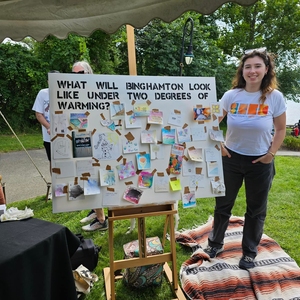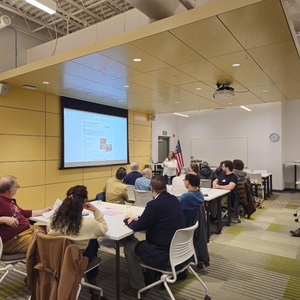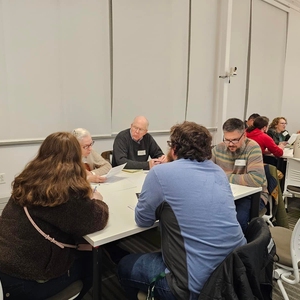Binghamton 2 Degrees: Building Community Resilience Through Collaborative Action
Binghamton University
Project Overview
Binghamton 2 Degrees is a transformative initiative uniting Binghamton University and the greater Binghamton community to envision a resilient future under the looming threat of two degrees of warming. Through storytelling, arts, scenario-based workshops, and interdisciplinary collaboration, the program engages diverse stakeholders to address local climate challenges such as severe flooding, migration, and public health crises through the lens of climate justice. By targeting the most vulnerable communities, we empower local residents to have a voice in identifying solutions that best meet their needs and prioritizing effective strategies for climate adaptation. Leveraging storytelling, arts, scenario-based workshops, and working groups, the project fosters community-led climate action while building capacity through interdisciplinary collaboration, grant partnerships, and outreach. Integrating natural and social sciences with arts and humanities, this initiative fosters inclusive strategies for climate adaptation while offering a replicable model for other regions.
Background
The Binghamton area faces increasing risks from climate change, including flooding, displacement, and public health challenges, which disproportionately affect low-income and marginalized communities. Recognizing the need for equitable and locally informed solutions, Binghamton 2 Degrees (B2D) was developed as an initiative derived from the Sustainable Communities Transdisciplinary Area of Excellence (TAE) at Binghamton University. The TAE fosters interdisciplinary collaboration to address complex sustainability challenges and develop innovative solutions that empower communities to thrive while meeting present and future needs.
Supported by FEMA and local partnerships, B2D builds on these principles by prioritizing the voices and needs of vulnerable populations to shape actionable, justice-oriented climate strategies. It integrates science, storytelling, and capacity-building efforts to inspire climate action and foster resilience in the Greater Binghamton area.
Goals
- Facilitate informed, inclusive climate dialogues to engage diverse stakeholders and address specific local vulnerabilities.
- . Develop actionable and equity-focused adaptation plans that prioritize historically marginalized communities.
- Empower residents and build capacity through participatory workshops and leadership opportunities.
- Serve as a replicable framework for other communities adapting to climate risks.
Implementation
Binghamton 2 Degrees is built on three interconnected components that collectively drive climate resilience, equity, and sustainability across the Binghamton area:
- Community Events Flagship events and monthly workshops catalyze engagement and action:
- Live at Confluence Park Festival (August 2023 and 2024): This arts and music festival, attended by over 1300+ community members over two years, features storytelling, participatory art, and educational booths, fostering dialogue about resilience and climate justice. Partnerships included the Broome County Arts Council, local artist groups, and over 20 environmental organizations like the Sierra Club and Climate Reality Project.
-
Monthly Themed Workshops (September 2023–March 2024): These workshops simulate future climate scenarios to prompt community-driven solutions. Scenarios address challenges like extreme heat, wildfire smoke, and natural disasters, incorporating diverse perspectives, including underrepresented communities. Participants discuss impacts (e.g., health risks, migration, flooding) and propose actionable responses (e.g., cooling centers, renewable energy hubs). Designed and hosted collaboratively with university faculty and nonprofit representatives, each workshop incorporated community feedback and practical training, such as emergency preparedness drills with the American Red Cross. Public outreach was conducted via community centers and public libraries to ensure inclusivity and engagement from diverse groups. *** Climate Change Summit (April 2024 and 2025)**: The summit gathers local nonprofit organizations, government offices, community members, and stakeholders to address climate resilience and regional solutions. In 2024, seven working groups were formed to address key climate challenges, such as energy, housing, food security, health, transportation, infrastructure, and refugees/social services. These groups elevate the voices of disadvantaged communities by integrating their perspectives into decision-making and prioritizing their needs. At the 2025 summit, working groups will present actionable projects and engage local decision-makers for support.
-
Working Groups Seven working groups focus on key areas (energy, health, housing, food security and agriculture, infrastructure and resiliency, refugees and social services, and transportation).
- Collaborative Approach: Over 70 organizations, including nonprofits, government agencies, departments of Binghamton University, and local leaders, participate. University faculty and classes provide research and data capacity to address gaps often faced by small nonprofits and local agencies.
- Outputs: The groups have worked on projects like resource mapping, planning for hazard mitigation and climate action plans, and vacant housing initiatives.
-
Capacity Building: These groups meet monthly, facilitating 23 meetings since September 2024, and have applied for external funding, including an EPA Community Change Grant proposal. Multiple groups are preparing to apply for grants due in 2026.
-
Research and Evaluation Rigorous research evaluates the program's impact and informs future initiatives:
- Panel Survey (2023–2024): Engaged 461 respondents to assess changes in climate beliefs and behaviors, with follow-up surveys tracking longitudinal impacts.
- Qualitative Interviews: Conducted 24 interviews with low-income residents and 17 with young professionals to understand lived experiences, barriers, and perceptions of climate change. Partnerships with food pantries and nonprofits like the Salvation Army helped recruit participants from vulnerable communities.
- Storytelling and Climate Narratives: Community members contribute oral histories or essays envisioning their future under climate change. These narratives inform strategies for outreach, policy, and community engagement.
- Social Media Analysis: Examined local climate discourse compared to other MSAs, revealing increased engagement post-launch of Binghamton 2 Degrees.
- Evaluation-Driven Adaptation: Insights from research directly inform working group initiatives, ensuring programs address community-specific needs and priorities effectively.
*Note: We have a FEMA report summarizing our accomplishments in detail. It is currently under review, but will be available to share once published.
Timeline
- 2023: Program launch, FEMA funding secured, pilot surveys and events conducted.
- August 26, 2023: Inaugural Live at Confluence Park Festival.
-
September 2023–March 2024: Monthly workshops and scenario events. * Climate Science (September 27, 2023) * Local Food Systems and Climate Change Resilience: October 12, 2023 * The Nexus of Food Security, Food Waste, and Climate Change: October 16, 2023 * Healthy Communities in a Warming World: November 13 & 29, 2023 * Community Energy Compass: February 5 & 21, 2024 * Natural Disaster Preparedness: March 27, 2024
-
April 26 - 27, 2024: Climate Change Summit and working group formation.
- August 24, 2024: Live at Confluence Park Festival.
- September 2024 - Ongoing: Seven working groups meet every month, with a steering committee meeting quarterly.
- 2024–Ongoing: Expanded research, storytelling initiatives, and third Live at Confluence Park Festival.
Financing
Funding combines FEMA grants, university resources, and local sponsorships: * FEMA (2023–2024): $10,000. * FEMA (2024–2025): $10,000. * University President’s Office: $140,000 over two years. * Sustainability Outreach Coordinator: $50,000 (20% allocated to the initiative).
Results
- Community Impact: The initiative has engaged over 1,500 community members through events, workshops, and working groups, raising awareness, increasing discussions about climate change, and building resilience across multiple sectors.
- Equity and Justice: The working groups center marginalized communities by directly involving them in decision-making, prioritizing their needs, and empowering them to drive adaptation efforts.
- Local Engagement: Expanded partnerships from 25 in our first year to over 70 offices, departments, and organizations, engaging low-income and student populations.
- Capacity Building: Partnering with university faculty, we provided data and research support to nonprofits and local governments, addressing gaps in resources and amplifying their capacity for action.
- Behavioral Change: Post-event surveys show increased participant confidence and understanding of climate issues, with a measurable rise (0.5 points) in climate literacy.
- Replicability: The project’s holistic approach has gained recognition as a model for community-driven climate resilience planning, with frameworks adaptable for other regions.
- Research Contributions: Identified gaps in community knowledge, such as uncertainty about individual actions' effectiveness.
Lessons Learned
- Equity and Inclusion: Prioritizing marginalized voices ensures that solutions are just and effective.
- Community-Driven Solutions: Prioritizing vulnerable populations ensures equity and effectiveness in climate strategies.
- Integration of Arts and Science: Combining scientific data with storytelling and creative initiatives fosters deeper engagement and understanding.
- Localized Solutions: Tailoring strategies to community needs motivates participation and ownership. Localized, actionable solutions resonate more strongly with participants and drive meaningful change.
- Partnerships and Collaboration: Partnerships between academia, government, and nonprofits amplify impact and strengthen community trust.



